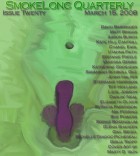You open this story with the question: “So what would you do in my situation?” This sets the reader up to solve a problem, in the classic mystery fashion. Do you consider this story mystery, albeit literary mystery?
Maybe. I think that addressing the reader, asking them a question, helps to involve them in the story—which I think is important. It’s also an invitation of sorts (one which I hope is usually accepted!).
I’m not sure whether it’s a mystery or not, though it is ambiguous. I think all stories can mean all things to all people so if someone decides that it’s a mystery, that’s great; it’s also great if they don’t.
This story has great tension. Do you have any tricks for creating and maintaining tension?
Thank you! To answer very generally: I think giving the reader almost everything can help. As can using short sentences; tension and pace are very close relatives. The other, perhaps very obvious, tip is to write about a situation which is, by its nature, tense.
What effect do you hope this story has on readers?
I hope it entertains them, more than anything. And I hope that, if any of them should come into possession of a hand grenade, they’ll think twice before pulling out its pin. And maybe (possibly rather mean of me) I think I might hope it reminds them of something silly they’ve done.
You’ve published a children’s book. Are you primarily a children’s author?
Um, no, I don’t think so, though in terms of books published I suppose I must be. There are plenty of Nik Perring stories for grown-ups out there!
While reading through the annual Kathy Fish Fellowship applications, I was struck by the number of writers who were using flash as, to paraphrase, a means to an end. Most people weren’t writing flash because they loved the form, because it took them places other types of fiction didn’t. Instead, they were using it as a gateway into longer works—short stories, short story collections, novels. As a champion of flash, I found this discouraging. Is flash fiction less satisfying, in terms of either writing or reading, than longer works? Or is it that the markets still haven’t accepted flash as a legitimate form? Why do you write flash, and where do you see it taking you?
I can see how that’d be disappointing. Flash fiction done well, as far as I’m concerned, can be every bit as valid, entertaining, moving, satisfying and difficult to write as anything else. A story is as long as it is. As long as it needs to be. Some stories are naturally short stories while others are, just as naturally, flash fiction.
I don’t think flash has been given the respect or backing it deserves, but I have detected a shift in attitudes towards it. More and more people are reading and writing it (and, like you, publishing it), and if that continues then the whole thing will continue to grow, as it should.
I write flash because I enjoy the form. I enjoy the moment(s) it captures, the intimacy, delicateness and tension. And I enjoy the challenge of writing it. As writers, we all know how much every word counts—with flash that’s hugely concentrated.
I must admit to not giving too much thought to where it might take me. I’d just like to continue writing, and reading, it.



 The SmokeLong Grand Micro Contest (The Mikey) is now an annual competition celebrating and compensating the best micro fiction and nonfiction online.
The SmokeLong Grand Micro Contest (The Mikey) is now an annual competition celebrating and compensating the best micro fiction and nonfiction online.